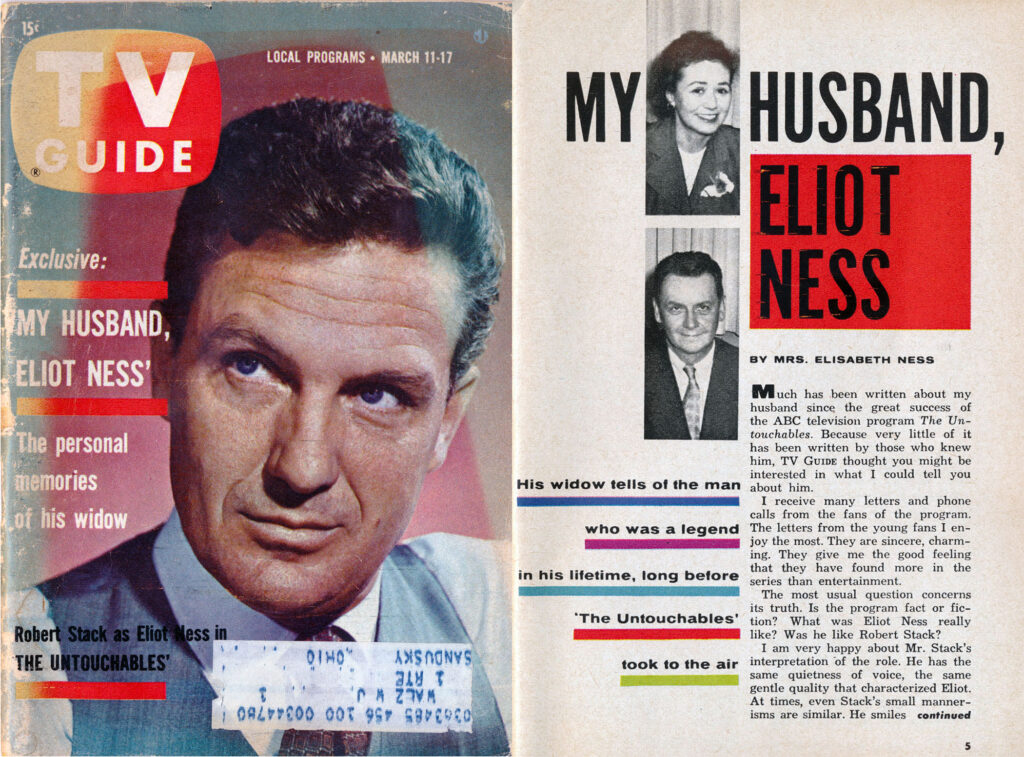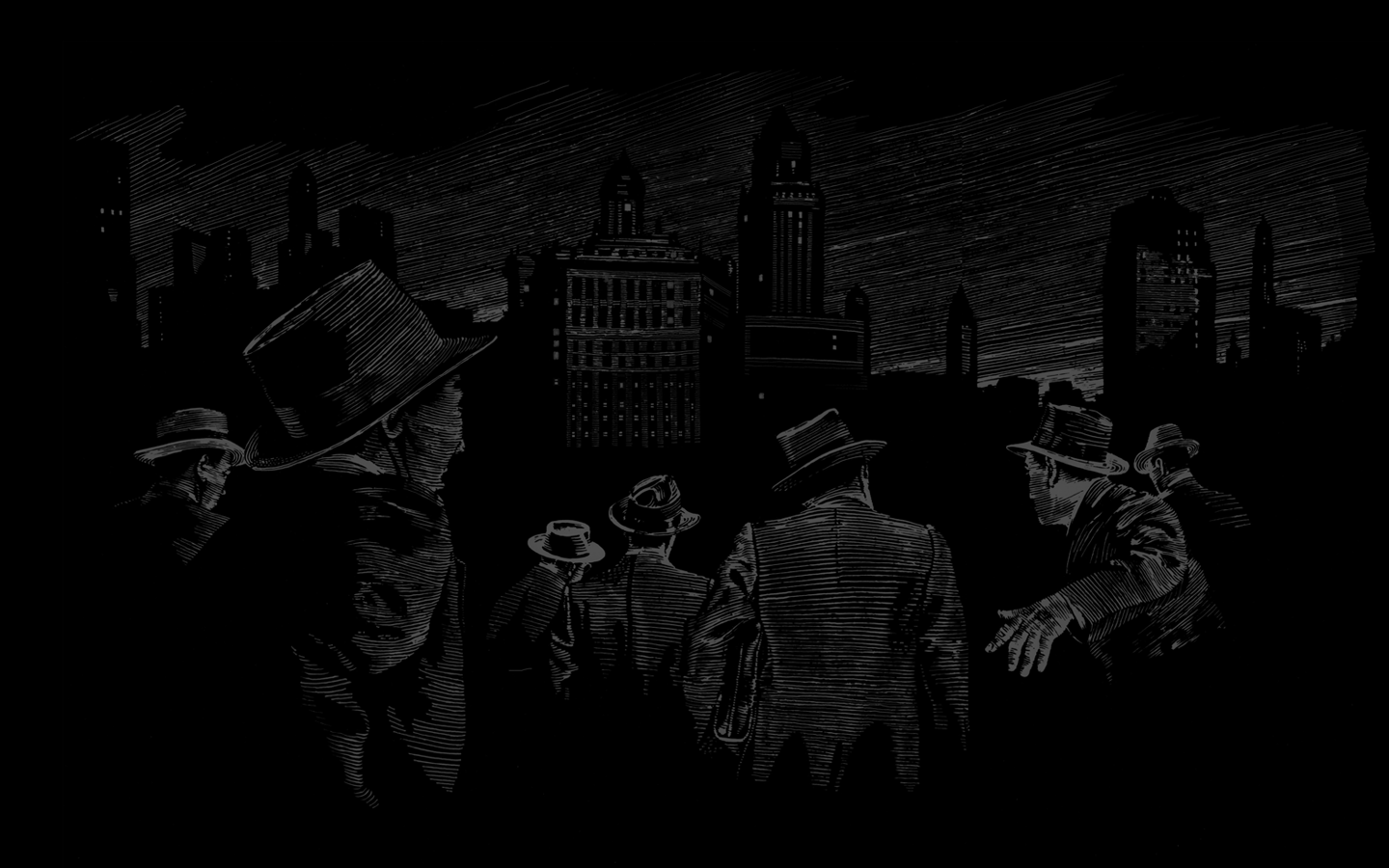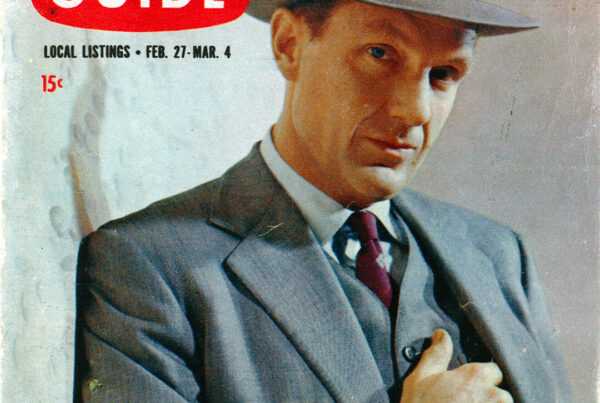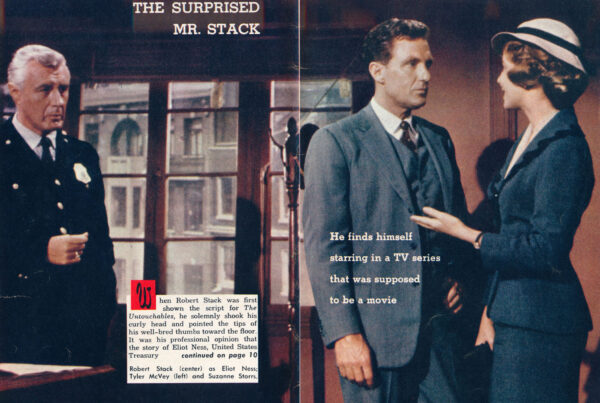
By Mrs. Elisabeth Ness
His widow tells of the man who was a legend in his lifetime, long before “The Untouchables” took to air
Much has been written about my husband since the great success of the ABC television program, The Untouchables. Because very little of it has been written by those who knew him, TV Gide thought you might be interested in what I could tell you about him.
I recieve many letters and phone calls from fans of the program. The letters from the young fans I enjoy the most. They are sincere, charming. They give me the good feeling that they have found more in the series than entertainment.
The most usual question concerns its truth. Is the program fact or fiction? What was Eliot Ness really like? Was he like Robert Stack?
I am very happy about Mr. Stack’s interpretation of the role. He has the same quietness of voice, the same gentle quality that characterized Eliot. At times, even Stack’s small mannerisms are similar. He smiles less, but Mr. Stack has been given less to laugh at than Eliot found in real life.
It has been explained before in this magazine how the first two-part show on television was based on Eliot’s actual experiences in Chicago soon after he graduated from the University of Chicago. The excitement of that true story, the excellence of the production, the superb casting brought us the well-deserved Emmy Awards and the weekly show.
I like the program and I wouldn’t miss it, even though I no longer know what it will be about. It is fiction, the stories are not of what Eliot was doing at that time. But since they are, in spirit, the same – the enforcement of law and order, the fights against exploitation of the law-abiding members of society, the hunting down of criminals – Eliot’s admirers should not feel let down.
The true stories, what was he was doing, are just as exciting as the fiction that you see.
I am sorry that the program included one or two cases that gave him credit for other men’s work. He would have resented that as much as the members of the FBI did.
He had pride in his own record.
It has occurred to more than one person who knew him that the TV series based on his personality is very fitting. His own life, until his death in 1957, was very like a series of adventures, episodes lived and completed. It covered a wider range than the stories so far presented, was more varied in personnel and in methods. Eliot was, in some ways, a restless man and an innovator. He was one of the first to use the lie detector, one of the first to install two-way radios in police cars. He was concerned about juvenile delinquency and civil rights long before they became headlights in the newspapers.
I live with a legend. At least I live with a TV program. But the truth is that I lived with a very real man who was a legend in his own lifetime.
For many years I have been accustomed to that second look and the question, “You mean the Eliot Ness?” when I give my name in a shop and when I am introduced to strangers. I liked it at first and I like it now.
The name and the man have always stood for something special to those who knew him, read about him, talked about him. And he was a man much talked about, written about, speculated about.
I believe that the chief reason for this lies in the word he gave to the show: “untouchable.”
No matter how much he might have wanted or cared for a thing, he was a man no one could bribe. This is a bewildering thing to some people. They are amazed and skeptical. It makes them uncomfortable. It also gives heart to those who share the trait. Eliot was unique, but he hit the headlines with this quality. It was and is a good thing.
Eliot Ness had enormous vitality and charm. No stony-faced crusader, he laughed easily and a lot.
But he could also look as grim as Robert Stack does at times on TV. His eyes were gray and could be very cold. This, with his very restrained manner of speech (he was no barker of orders, no fist thumper), brought him attention and respect from those he was dealing with.
He was, in a sense, invulnerable.
When the things you care about the most are not material, and that was true of Eliot, it is pretty hard to reach or hurt a man.
He was called a “boy scout” and a “do-gooder.” Yes, but he was a practical do-gooder. He never tried to reform the world. He enjoyed it. He was gregarious, he liked to entertain, to be with people.
He liked to be at home, so a lot of his work was done there. Our house or apartment, wherever we were living, was accustomed to the unexpected guest, the delayed dinner hour. Our friends came from every level of life. Like attracts like, and Eliot attracted his own kind. They ranged from writers and artists to generals, from judges to the policeman on the beat, from the prominent to the out-of-work. They were all good to know and to listen to. Eliot watched and listened more than he talked.
He liked to surprise. He enjoyed most of the sudden deflation of a stuffed shirt, even if he was in it (which was seldom.) When he was reminded, as he was occasionally, of old adventures, most of his stories were very funny, and usually on himself. But he was always too busy living in the present to talk much about what was past. I think it was this quality which made his son Robert say, “I like Robert Stack as Dad, but he was like Maverick too.”
I know he had a temper, and I know because he told me, that with all the courageous things he did he was often, in his own words “scared.” Neither thing ever showed. He had self-control. Our good friend Corinne Lawson, who recently worked for us for many years, said recently “I tell my friends, in all those years at your house I never heard Mr. Ness raise his voice in anger or speak bad to anyone. They don’t believe me, but you know it’s true.”
It is true. And his personal courage is a matter of record.
He had his own manner of speech. He didn’t swear. Well, I did hear him once or twice, and it was colorful, but it was not a habit. His expressions were his own, not current slang.
In fact, along with “untouchable,” the other keyword for Eliot Ness is “independent.” He was no joiner of groups, not given to cliches. He wanted no ready-made principles or concessions. He didn’t follow the routines of others. He was as independent as a cat, and as fastidious, and as tough.
Too masculine to feel the need to prove it, he avoided stag parties when he cold. He enjoyed the company of men, but liked it better well-mixed with attractive women.
Hunting and fishing were fine for other people. For himself, he didn’t like killing. Guns and violence were a part of his life, but not a pleasure or a sport.
All the same, he would be very proud of the certificate his son brought home from the rifle range at camp last summer. He was no dictator of others’ tastes. His own interests and tastes were as varied as his friends. He liked art, boats, cars, music, the Indianapolis 500, the theater, ballet, tennis, and handball.
He liked people, and most of all, I think, he liked kids. He was a very good father. He had an instinct about children and an understanding of their needs. He enjoyed and loved them. His son had too short a time with his father, but I sometimes feel that he received more love and attention in those years than some boys get in a lifetime.
This article has grown longer than it meant to be. When a woman has been very happy she likes to talk about it. There wasn’t a dull moment in Eliot Ness’s life. There wasn’t a dull moment in my life married to him. I loved every minute of it.
Originally published in the March 11th, 1961 issue of TV Guide.




